Related Research Articles
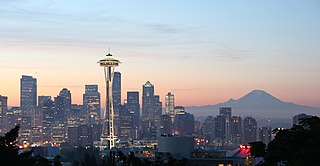
The Pacific Northwest (PNW), sometimes referred to as Cascadia, is a geographic region in western North America bounded by its coastal waters of the Pacific Ocean to the west and, loosely, by the Rocky Mountains to the east. Though no official boundary exists, the most common conception includes the U.S. states of Oregon, Washington, Idaho, and the Canadian province of British Columbia. Some broader conceptions reach north into Alaska and Yukon, south into northern California, and east into western Montana. Other conceptions may be limited to the coastal areas west of the Cascade and Coast mountains. The variety of definitions can be attributed to partially overlapping commonalities of the region's history, culture, geography, society, ecosystems, and other factors.
The Territory of Washington was an organized incorporated territory of the United States that existed from March 2, 1853, until November 11, 1889, when the territory was admitted to the Union as the State of Washington. It was created from the portion of the Oregon Territory north of the lower Columbia River and north of the 46th parallel east of the Columbia. At its largest extent, it also included the entirety of modern Idaho and parts of Montana and Wyoming, before attaining its final boundaries in 1863.

The Pacific Time Zone (PT) is a time zone encompassing parts of western Canada, the western United States, and western Mexico. Places in this zone observe standard time by subtracting eight hours from Coordinated Universal Time (UTC−08:00). During daylight saving time, a time offset of UTC−07:00 is used.

Arnica is a genus of perennial, herbaceous plants in the sunflower family (Asteraceae). The genus name Arnica may be derived from the Greek arni, "lamb", in reference to the plants' soft, hairy leaves. Arnica is also known by the names mountain tobacco and confusingly, leopard's bane and wolfsbane—two names that it shares with the entirely unrelated genus Aconitum.

Anthocharis stella, the stella orangetip, is a species of butterfly found mainly in the Rocky Mountains in the United States where its caterpillar feeds on different kinds of rock cress. It has two subspecies.
The Endeavour Award, announced annually at OryCon in Portland, Oregon, is awarded to a distinguished science fiction or fantasy book written by an author or authors from Pacific Northwest and published in the previous year.

The Cascadia movement is a bioregional independence movement based in the Cascadia bioregion of western North America. Potential boundaries differ, with some drawn along existing political state and provincial lines, and others drawn along larger ecological, cultural, political, and economic boundaries.
The Pacific NorthWest Economic Region (PNWER) is a statutory collaborative regional U.S.-Canadian nonprofit organization dedicated to addressing common issues and interests like encouraging global economic competitiveness and preserving the natural environment. The Canadian provinces and territories of British Columbia, Alberta, Saskatchewan, the Yukon, the Northwest Territories along with the American states of Alaska, Washington, Idaho, Montana and Oregon compose the membership. It is designed to improve cooperation and communication between member jurisdictions as well as improve communication between the public and private sector. The Pacific Northwest Economic Region (PNWER) serves as a cross-border forum for both public and private sectors, facilitating open dialogue. This forum leverages the collaborative efforts between business leaders and elected officials with the aim of enhancing the region's global competitiveness. Former BC cabinet minister and legal scholar Andrew Petter describes the PNWER as one of North Americas most sophisticated examples of regionalist paradiplomacy.
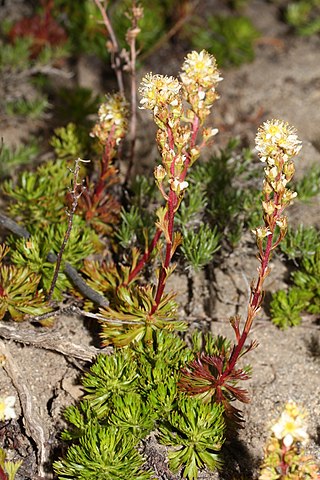
Luetkea is a genus of herbaceous plants in the family Rosaceae. One species is accepted. Luetkea pectinata is a mat-forming semi-shrub. It is endemic to the cold portions of western North America occurring in subarctic Alaska, Yukon, western Northwest Territories, and subalpine to alpine regions of British Columbia, southwestern Alberta, Washington, Oregon, Idaho, northern California and western Montana.

Senecio triangularis, known as arrowleaf ragwort, arrowleaf groundsel and arrowleaf butterweed, is a species of the genus Senecio and family Asteraceae.
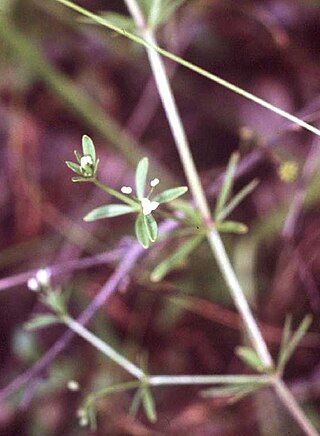
Galium trifidum is a species of flowering plant in the coffee family, known by the common name three-petal bedstraw. It grows widespread in the arctic, temperate and subtropical regions of the Northern Hemisphere: northern and central Asia, northern and eastern Europe and much of North America.

The Young Reader's Choice Award is an award program of the Pacific Northwest Library Association (PNLA) which was inaugurated in 1940 by Harry Hartman, a well-known Seattle based bookseller. It is the oldest "children's choice" award in the U.S. and Canada and the only award chosen by children in two countries. Initially a single award, in 1991 the award expanded to include both a Youth and Senior category. In 2002, a third award category, Intermediate, was created. The PNLA now offers three annual awards for books selected by schoolchildren in the Pacific Northwest. The PNLA homepage heading is "Alaska, Alberta, British Columbia, Idaho, Montana, Washington", a list of the four U.S. states and two Canadian provinces where most of its members are located. It is the oldest regional association and the only binational one in the US and Canada.

The West Shore was a literary magazine published in Portland, Oregon, United States from 1875 to 1891. It was founded by Leopold Samuel to promote a positive image of the Pacific Northwest and to encourage economic growth in the region. The magazine was known for publishing excellent articles by well-known authors and for its many high-quality illustrations. As a result, West Shore became one of the most successful publications in the Pacific Northwest. Its finely executed illustrations showed the scenery, architecture, and commerce of Oregon, Washington, California, Idaho, Montana, British Columbia, and Alaska. Today, West Shore illustrations provide a detailed record of the Pacific Northwest as it existed in the second half of the nineteenth century.

There are 14 species of amphibians and 5 species of reptiles known to occur in Mount Rainier National Park.

Salix commutata, the undergreen willow, is a plant species native to western Canada and the north-western United States. It has been reported from Alaska, Yukon, the Northwest Territories, British Columbia, Alberta, Saskatchewan, Montana, Idaho. Washington and Oregon. It grows on rocky alpine and subalpine slopes, conifer forests, stream banks, bogs, etc.
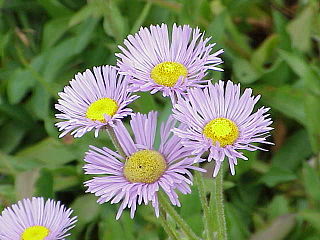
Erigeron glabellus is a North American species of flowering plants in the family Asteraceae, called the streamside fleabane.
The Pacific Northwest Golf Association (PNGA) was established on February 4, 1899 and serves as a golf governing body that conducts championships and promotes golf activities to golfers located in the Pacific Northwest region of North America. The territory of the PNGA is divided into five different zones, made up of about 175,000 members and 650 golf courses.
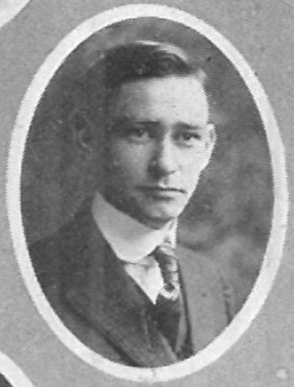
John S. Richards was a librarian who served as the president of the American Library Association from 1955 to 1956.
References
- ↑ "Pacific Northwest Library Association". Pacific Northwest Library Association. Retrieved 2021-01-14.
- ↑ "UI Library Associate Professor Elected President of Pacific Northwest Library Association". University of Idaho. 2017-08-30. Retrieved 2021-01-14.
- 1 2 3 4 Frederiksen, Linda (Summer 2009). "A Century of Cooperation: The Pacific Northwest Library Association, 1909-2009" (PDF). PNLA Quarterly. 73 (4): 5–35. Retrieved 14 January 2021.
- ↑ "PNLA Quarterly". Pacific Northwest Library Association. 2018-02-05. Retrieved 2021-01-14.
- ↑ Appleton, Marion (2020-06-10). "Index of Pacific Northwest portraits". Internet Archive. Retrieved 2021-01-14.
- 1 2 "Pacific Northwest Library Association's Young Reader's Choice Award Archives". Canadian Children's Book Centre. Retrieved 2021-01-14.